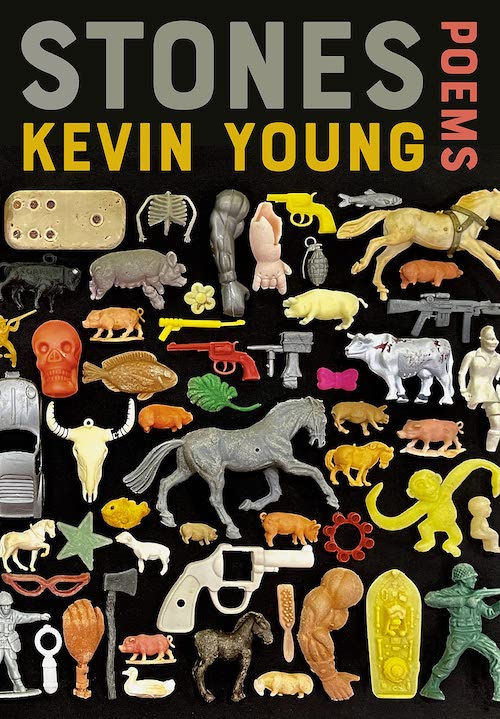When we asked Poetry Daily Editorial Board Member Ilya Kaminsky to write about a book that was important to him in 2021 for our “Books We’ve Loved” series, he replied he couldn’t pick just one. Below is the second installment of Ilya Kaminsky’s notes on some of the many books he’s loved in the past year. (Read the first installment here.)
Kaveh Akbar‘s “Pilgrim Bell” brings together prayers and songs of protest, origin poems and immigrant narratives and sets them to music of syntax that isn’t exactly broken, but reassembled, set to a newer, stranger rhythm. There is terror (“I am present and useless like a nose torn / from a face and set in a bowl”) yes, but there is also a secret knowledge that “Dark on both sides. / Makes a window.” I was moved by this playful and urgent joining of devotional and protest poetics, very moved.
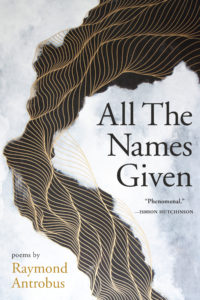
If sound and silence are mere metaphors, what lives behind that big door? What is memory and how to live with it? Raymond Antrobus knows how to ask. And how to live despite it. And how to walk towards knowledge. In All the Names Given knowledge arrives thus: “I feel guilty asking / someone to repeat, but she repeats and / nobody dies. Maybe kindness is how / you take down the stalls. This waitress / and my mother would show up at my funeral, a short speech written on receipts.”
“This pebble here is a monument to someone,” writes Polina Barskova in Air Raid, a moving book that includes a heart-breaking cycle about the siege of Leningrad. Beautifully translated by Valzhyna Mort, this poetics is multi-vocal. It echoes the voices of victims, and makes sure many other poets’ lines resonate as pages turn, yes—and yet it is silence, at the core of Barskova’s metaphysics, that moves me the most. It is her silence that knows the limits of any human response to historical horror: it is her silence that orchestrates melodies unheard.
“Better the privilege of booze / than the whim of one more shambolic / butcher shelling peasants in a wood, / our world’s long spree of Caesars / starting wars to pay their bills / in any given era’s Rome,” writes Erin Beliu. She’s got style. Few poets have mastered the arts of rhetoric so well to use it as knife and fork and as a dinner plate, too, on a daily basis. The jokes, the asides, the off-hand commentaries in Come-Hither Honeycomb have a rhythm all their own. Her line-breaks don’t just give us lovely surprises: they deliver punches. What a book!
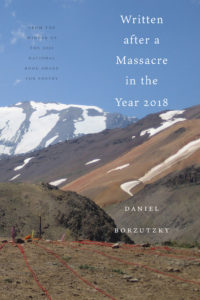
Daniel Borzutzky‘s song of dismay and terror in Written After a Massacre in the Year 2018 is a work of reckoning, a nightmare set to music. Take, for instance, this: “Middle managers mistake manipulative / merchants for munificent moralists. A military / massacre on the municipal motorway is like / a military massacre on the municipal motorway. / Metaphysical mayors mediate the mythology of mystical margins while monitoring the murders of migrants.” Neruda’s refusal of metaphor is given a new life here, one that has a pinch of Tennyson’s love of sound, and whole lot of Borzutzky’s rage against the machine.
Playlist for the Apocalypse is quintessential Rita Dove: ethical and lyrical, moving in and out of the whirlwind that is history, playful in her use of form—sonnets, odes, addresses, invocations, aubades—and generous in her gathering of different voices and tribes to her pages. Yet here she is also something very new, and very personal: “I don’t want to pass away in your arms / those gentle parentheses / nor expire outside of their swoon / self propelled determined shouting / let the end come / as the best parts of living have come / unsought & undeserved / inconvenient.” Coming after this, the book’s final poem, a version of Goethe’s famous “Wayfarer’s Night Song,” breaks my heart: “Above the mountain tops / all is still / among the treetops / you can feel / barely a breath — birds in the forest, stripped of song. Just wait: before long / you, too, shall rest.”
In Wound from the Mouth of a Wound lyriking is “poverty inventing new magics,” is finding “so many methods to tend this garden / of salted flesh.” This gaze tells us how it is, how beauty and terror enter our hour: “A palm full of garlic cloves. / A flight of headless doves.” What does it mean to live in a body? What does it mean to survive & offer a song? This book was published in the final week of 2020, but torrin a. greathouse asks good questions, so I count it here as 2021’s first born.
When a poem has a bird in it, Heather Green thinks of a beloved in Nebraska. And in the same poem you will get Tom Cruise and scars, and asides, and mistakes, and politics and an understanding: “The bird was suffering, covered in dirt/ more than hurt, the bird showed how soft / the real world sometimes is. / Now what I’d expected. / How awfully soft.” No Other Rome is filled with poems like this, that surprise with their turns and shifts, and sway the reader in.
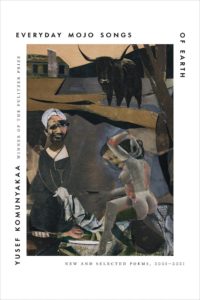
For decades the enjambments and images and jazzy rhythms of Yusef Komunyakaa have dazzled our senses with surprise and skill. “Humans crave immortality, but oh, / yes, to think worms wove this / as a way to stay alive in our world,” he writes of silk, but one thinks of words, which become creatures in his pages, alive, breathing, eating their way through history, music and the horror of days, beauty and abandon. One hundred and forty poems, including twelve new ones, in Everyday Mojo Songs of Earth, give a wonderful and necessary retrospective.
Sandra Lim’s The Curious Thing makes me think of Glück’s work in a way that I find interesting. Lim has understood, it seems to me, how to make a fable out of a lyric fragment, how to take advantage of plain language by positioning it against tone, how to magnify emotional resolve by distancing from emotion. I wonder at times if Glück learned this from Cavafy. However that happened, it works beautifully in Lim’s poems, which are humane and true.
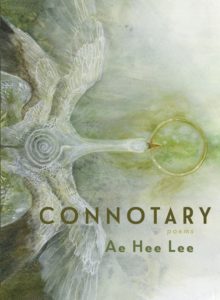
As the reader turns the pages of Connotary she will see Ae Hee Lee brings together Korean, Spanish and English and perhaps a fourth language, that of images: “At all sides, the trains slip away from us. / My sister and I play Red Light, Green Light // bet with eyes closed.” This poet investigates migrations and translations via the language of spring onions and rooftops and shoes. We learn we are in transit as we read: “I’ve become an expert / at packing exactly 50 lbs. / worth of breadcrumbs.” This chapbook is a lovely debut.
Maureen McLane‘s More Anon gives a wonderful retrospective of her work from five books, a window on the beautiful mind that knows how to propel us with music and flair. There will be many moments when you will laugh out loud as you turn the page, but there will also be moments of quiet, for McLane is a master of nuance–and one thing about her precision is that it actually teaches a reader how to be attentive, to slow down, to see. But because it is McLane, this nuance is always playful, dazzling: “gulls alit on the late / little white splendors / looking to shit on the dock.” That is to say, she’s got the style and she isn’t shy about it: “I take pleasure / annihilating all the world // to a penned thought caught / in a fan’s whirring blade”. What great fun to follow this thought.
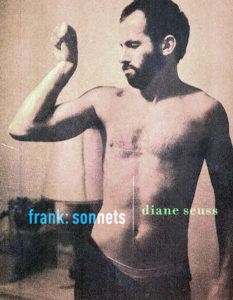
frank: sonnets by Diane Seuss is a tour de force, a narrative memoir that is both formally inventive and emotive, a beautiful blend of lyric and storytelling. Here is how her lyric mind works: “Form this bench I like to call my bench I sit / and watch my tree which is not my tree, no one’s / tree, the quiet!” And here is how it’s opened up by her tonal range as the speaker considers the very genre of memoir: “here I am in the ever-later looking back at the half-assery / of my days and the redness of my nights, innards-red preserved / in my skull.” The fact is that this book is a compelling story but the reader can’t stop quoting its lines for their cheery beauty is a point in and of itself. It is hard not to quote, as the lines are just too good: “in inopportune mouthfuls, mouthfuls by which / I consumed, in the past, my life. Did I consume my life in bitter / mouthfuls? The storytelling makes it seems so but in actuality / I dragged a bit my heels.”
And some poets just keep singing, no matter what hard time of day it is. “I walk alone in the snow,” writes Maggie Smith, “squinting up into the big, wet flakes / letting them bathe my face. I tell myself / it is a kind of touch.” In the time of pandemic, this is certainly welcome. Smith’s gift is that she is unafraid of the real, of the uncharted territory: “I’ve talked so much about loving the world— / is this how it’s done? I am offering / the only thing I have. I am holding out / my hand, feeding myself to the hungry future.” In Goldenrod, Smith writes with abandon, humor, tenderness, yes. But while she speaks, she is also listening: “I have started calling the hum / soul. Today I have to hold / my breath to hear it.”
Craig Morgan Teicher’s poems have something Shklovsky once called otstranenie, or defamilirization, in them, so a man walking on the seashore with his daughter is plunged into the spin of time: “He can’t understand / what happened—they had only just / turned to go home, but more time must / have passed. A moment, and it’s already now.” Welcome to Sonnetville, New Jersey is a terrific work of lyric bewilderment, one that deserves a much broader audience.
Mai Der Vang‘s Yellow Rain is a powerful reckoning and innovative poetry, a book that lays history bare, and that burrows deeper into what poetry can do. It is also very lyrical, disarming. Take, for instance, this: “Here lies / the ashes // of our / sanity”. Witness testimonies and declassified documents assembled here give us a powerful indictment of the travesty that was US bombing in Laos. One thinks of Rukeyser and Reznikoff and many others in the long and important tradition of documentary poetics. But the lyricism here is Mai Der Vang’s own: it is her voice that looks at the powers-that-be and vows to “come back / as the carved edge of a claw.”
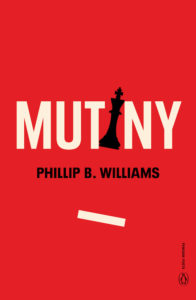
Phillip B Williams‘ Mutiny is certainly one of strongest books this year. First of all, Williams’ poems are well made. There is music that is very much his own, and there is rhetoric which is earned, and felt-through. This poet doesn’t get on a podium to lecture at us about history, but woos us with his alliterations and inner-rhymes to deliver the knowledge of pain which is history. And his use of repetitions, of syntax to open up the range of emotion is marvelous. Take, for instance, this: “It was the living-past / and it wasn’t. It was / the fully blossomed Xs // bending beneath him / who was thought dead: get the hell out of my life, // though he returned. Shield-/less. A field of sky / breaking, breaking. A door / knocked on, a door / like a voice / opening.”
Kevin Young’s music can be erotic, it can be surreal, it can be serious, revelatory, or playful, or all of this at once: “Where the train once rained / through town / like a river, where the water // rose in early summer / & froze come winter— / where the moon // of the outhouse shone / its crescent welcome, / where the heavens opened // & the sun wouldn’t quit— / past the gully or gulch / or holler or ditch // I was born.” Stones is a gorgeous book. No one writes like Kevin Young. Frankly, no one can.
Hong Kong Without Us: A People’s Poetry, edited by The Bauhinia Project, gives us poems found scrawled or printed on Hong Kong walls, last wills and testaments, anonymous poems from a protest movement “led by children” who covered their faces during the uprising, but whose protest woke up their fellow citizens. It is a powerful testament, one that makes me think of Anna Swir’s great book, Building the Barricade. The voices here are endlessly compelling: “I’m just a housewife / Last night I joined a rally / It was pouring // When I looked up / An umbrella was shielding me / raised by a teen.”

